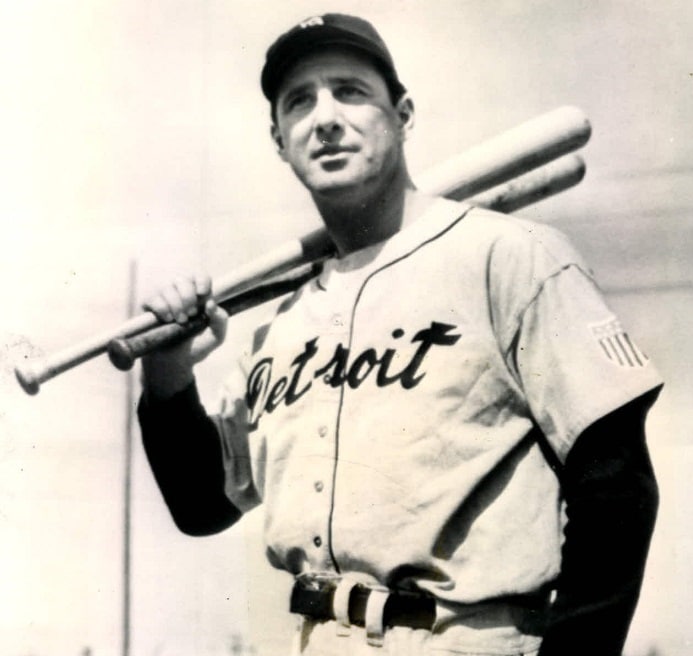
Jump to:
- #1. Hank Greenberg Did Not Play
- #2. Frank Navin Died Shortly After The Tigers Won The World Series
- #3. The Cubs Had A Miracle Regular Season Push To Get Into The World Series
- #4. Tommy Bridges Was The Hero Of The Series
- #5. Goose Goslin Drove In The Series Winning Run
- #6. The Cubs Curse Continued
- #7. Detroit Had Become The City of Champions.
#1. Hank Greenberg Did Not Play
As the Detroit Tigers entered the 1935 World Series, they came in with Hank Greenberg as their best offensive player.
Greenberg was having a monster year and was leading the American League in many offensive stats, but the Tigers would be forced to win without him.
In Game 2, Greenberg collided with Cubs catcher Gabby Hartnett and broke his wrist. This would sideline him for the rest of the series.

#2. Frank Navin Died Shortly After The Tigers Won The World Series
Frank Navin had owned the Detroit Tigers since the 1908 season and had seen many great teams play for the Tigers.
He saw Ty Cobb and the Tigers win consecutive pennants only to lose in the World Series. The Tigers again made it to the World Series in 1934, only to lose to the St. Louis Cardinals. The loss left him heartbroken.
In 1935, Navin finally got his wish and saw his team beat the Chicago Cubs. Six weeks later, while riding a horse, Navin had a heart attack and died.
#3. The Cubs Had A Miracle Regular Season Push To Get Into The World Series
The 1935 season is remembered mainly for the Cubs' 21-game winning streak. The streak began on September 4 with the Cubs 2.5 games out of first place.
They would not lose again until September 28. The streak propelled the Cubs to the National League pennant.
The 21-game winning streak tied the franchise and major league record set in 1880 when they were known as the Chicago White Stockings.
#4. Tommy Bridges Was The Hero Of The Series
Tommy Bridges became the hero of the series after his complete-game win in Game 6 to close out the series.
Bridges pitched a gutsy 9th, and Mickey Cochrane deserves credit for trusting his pitcher to battle out of a terrible start.
Bridges gave up a leadoff triple to Stan Hack, and what followed would reinforce the belief that the Cubs were under a curse.
This comes from SABR:
Jurges then struck out on three pitches. Grimm’s pitching staff was thin, so he had to let pitcher Larry French bat. French grounded out to the pitcher. Augie Galan ended the frustrating inning by flying out to left field, leaving Hack stranded.
#5. Goose Goslin Drove In The Series Winning Run
1930s baseball players had their share of nicknames, but perhaps none were as notorious as the future Hall of Fame outfielder Goose Goslin.
After surviving the top of the inning with Tommy Bridges, the Tigers got a man on base. Goose Goslin stepped up to the plate and hit the winning single, as seen above.
#6. The Cubs Curse Continued
The Chicago Cubs were the most dominant National League team in the first decade of baseball and established one of the first dynasties.
However, after 1908, they seemed always to come up just short.
The 1935 World Series was the fifth appearance in a World Series since 1908. They appeared in the 1910, 1918, 1929, and 1932 World Series, and even if they did not win the pennant, there were many seasons they were competitive.
In 1945, the curse became known as the Curse of the Billy Goat.
#7. Detroit Had Become The City of Champions.
When the Detroit Tigers won the 1935 World Series, the city of Detroit was mired in the Great Depression, which had hit the city and its industries particularly hard.
However, with the success of the Tigers and other Detroit teams and athletes in 1935/36, Detroit's luck appeared to be changing, as the city was dubbed the "City of Champions."
The Lions continued Detroit's winning ways by capturing the 1935 NFL Championship Game, followed by the Detroit Red Wings winning the 1935–36 Stanley Cup championship.
With the Stanley Cup win, the city had seen three major league championships in less than a year.
Detroit's "champions" included Detroit's "Brown Bomber," Joe Louis, the heavyweight boxing champion; native Detroiter Gar Wood, who was the champion of unlimited powerboat racing and the first man to go 100 miles per hour on water; and Eddie "the Midnight Express" Tolan, a black Detroiter who won gold medals in the 100- and 200-meter races at the 1932 Summer Olympics.
